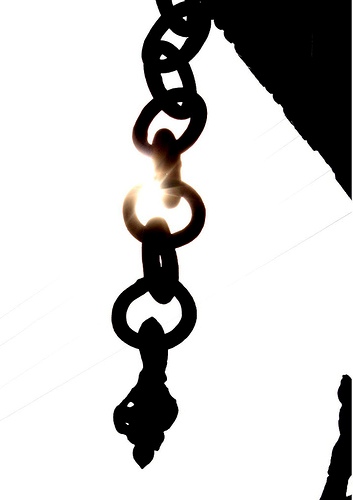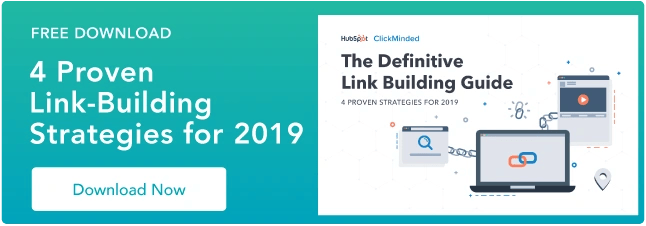In search engine optimization, inbound links are a marketer's most powerful asset. Given that off-page SEO (as opposed to on-page SEO) accounts for the majority of a web page's ability to rank for a particular keyword, building authoritative and relevant links into your website from external sites isn't exactly something you should overlook in your SEO strategy.

But while link-building is critical, it's also tricky, considering giving an inbound link is the decision of the website linking to you, which isn't something you have complete control over. Therefore, it's one of those inbound marketing tactics that requires dedication and the realization that success won't happen overnight. So how can you take control of something that is seemingly out of your hands? Don't worry; you're not totally out of luck.
If you're new to the concept of an inbound link, read this introductory article about inbound links before you move on. All set? Great! Now you're ready to tackle 8 powerful link-building tactics to improve your business' search engine optimization.
Link-Building Tactics to Boost Off-Page SEO
1. Submitting to Website Directories: This is one of the few link-building tactics you do have complete control over. That said, it's also one of the tactics with the least SEO mojo. While inbound links from website directories may not have a ton of authority, the ease of submitting your website to them to jumpstart your link-building efforts makes it totally worth it, especially the free ones.
2. Content Creation (Link Bait): Another link-building tactic you have complete control over is your ability to create remarkable content that others naturally want to link to. This type of content historically gets a bad rap as 'link bait,' which can be defined as content specifically created with the goal of generating attention and encouraging others to link to the website. But that doesn't mean all 'link bait' content is bad. As long as the content you're creating has value to your target audience, why wouldn't you want others to link to it? Content that typically makes great link bait content are types that get shared a lot, including original data and research, infographics, viral videos, and content about controversial topics. A business blog is the perfect platform for this content.
3. Networking & Building Relationships: While networking and relationship-building takes time, it's a very effective way to keep your business and your content on the minds of people who might be interested in linking to you. Make a list of the bloggers in your industry who have authoritative and relevant websites. Then start building relationships with them. Follow and tweet with them on Twitter, and give them a little link love by linking to their content in your own blog articles. Once you're on their radar, they may be more inclined to link back to you if you have content that's relevant to their audience, too. Reciprocity is a beautiful thing!
4. Optimizing Your Social Media Presence: Okay, we were admittedly a little bit sneaky with this one. Yes, many social media sites use 'nofollow' tags, meaning you don't get any SEO juice from links on your social media profiles or links you share through your social media updates. But even though these links may not benefit your search engine rankings, they're still links from an external source into your website. Plus, search engines are increasingly using social cues to identify authoritative websites and content. Use the links in your social media profiles wisely; point them to your website to direct viewers of your profiles back to your website. After all, isn't the ultimate goal to get them there, regardless of how they found you?
5. Asking (Politely): We're not suggesting that you beg and bribe your way into generating inbound links. However, there are certain occasions when it's okay to politely ask a fellow blogger to link back to you. For instance, say you got a great mention in a news article on a site with a good amount of authority. The website cited your data and mentioned your company's name as the source, but where's the link love? In these cases, it's perfectly reasonable to politely email the author, thank them for mentioning your data, and ask them to please include a link back to your website as well. As a bonus, if you have a good relationship with this website owner or blogger (see tactic #3), you might even be able to leverage that relationship to request specific anchor text and the URL you want them to link back to. Chances are, they didn't have your business' specific SEO strategy in mind when they mentioned you, and they may be perfectly happy to grant your request.
6. Submitting News Releases to Distribution Services: Although news releases can be a great way to get the word out about your company's product news and other important updates, they also have great SEO benefits. Every time your release gets distributed by a wire service and syndicated on a website...BAM!...an inbound link. Even better is when a website picks up and covers the news you're promoting in an article of their own, generating an even more valuable inbound link. While most news release distribution services charge for their services, there are a few free ones you can leverage, as well. To get the best bang for your buck, use news releases to share news about content you create that is particularly link bait-friendly, such as new data and original industry research reports you might release.
7. Leveraging Co-Marketing Partnerships and Initiatives: Partnerships and co-marketing opportunities can be a great way to generate inbound links. Generally, co-marketing initiatives are conducted with partners that sell products or services that aren't competing with your own, but are complementary. Consider leveraging those relationships in your link building efforts. You link to them. They link to you. Everyone's happy.
8. Guest Blogging (External Content): We saved the best for last. Guest blogging is probably the most effective way to generate quality inbound links to your website. Yes, it requires more content creation on your part, but the results are lasting and powerful. Think about it: what business that understands the importance of inbound marketing isn't trying to provide a steady flow of fresh content? If you were struggling to fill your blogging queue with valuable content, wouldn't you jump at the opportunity to publish a guest post from a fellow qualified blogger? As a blog manager, they get fresh content with little effort. As a contributor, you get control over the anchor text and URLs for the keywords you're targeting. Win-win!
What are some other powerful link-building tactics you can use to boost your business' off-page SEO?
Image Credit: Sudhamshu Hebbar


.jpg)
-Sep-29-2023-11-40-51-6755-PM.png)





![How to Find & Add Nofollow Links to Your Website [Step by Step]](https://blog.hubspot.com/hubfs/how-to-add-nofollow-links.jpg)

